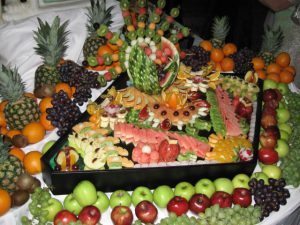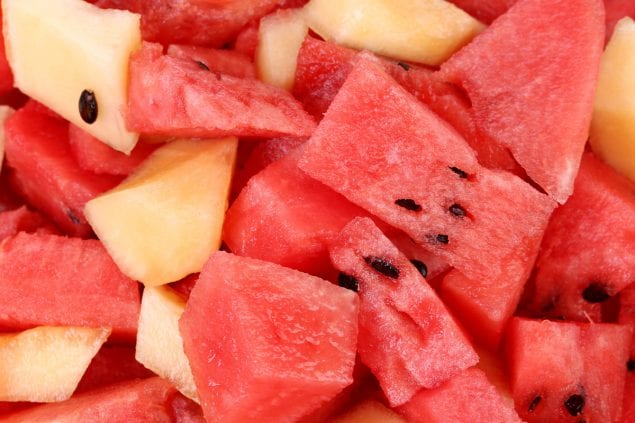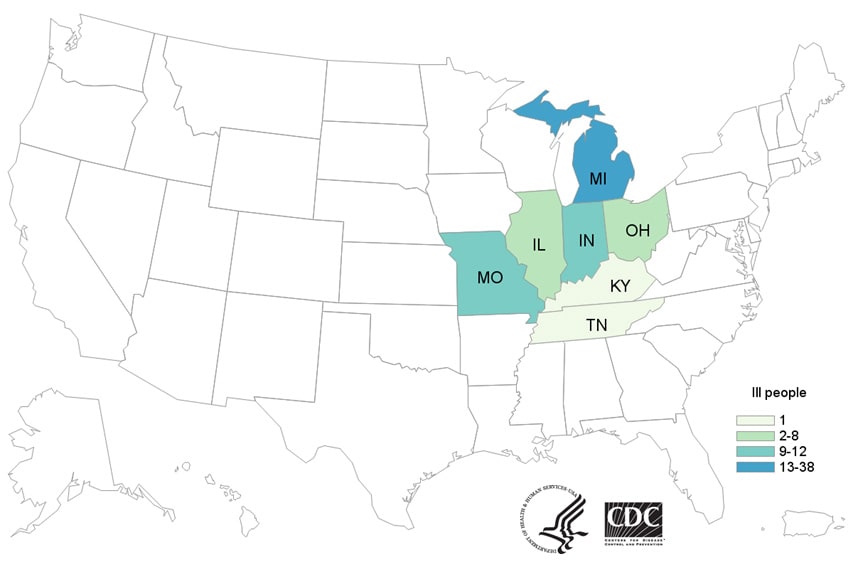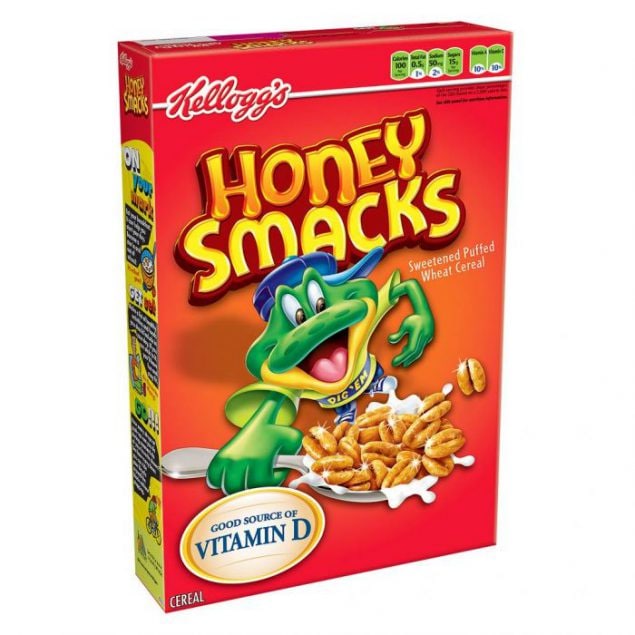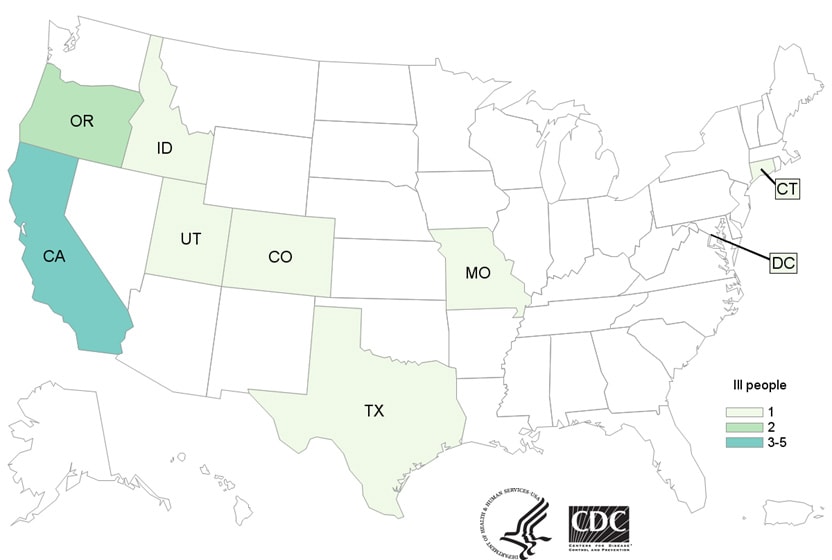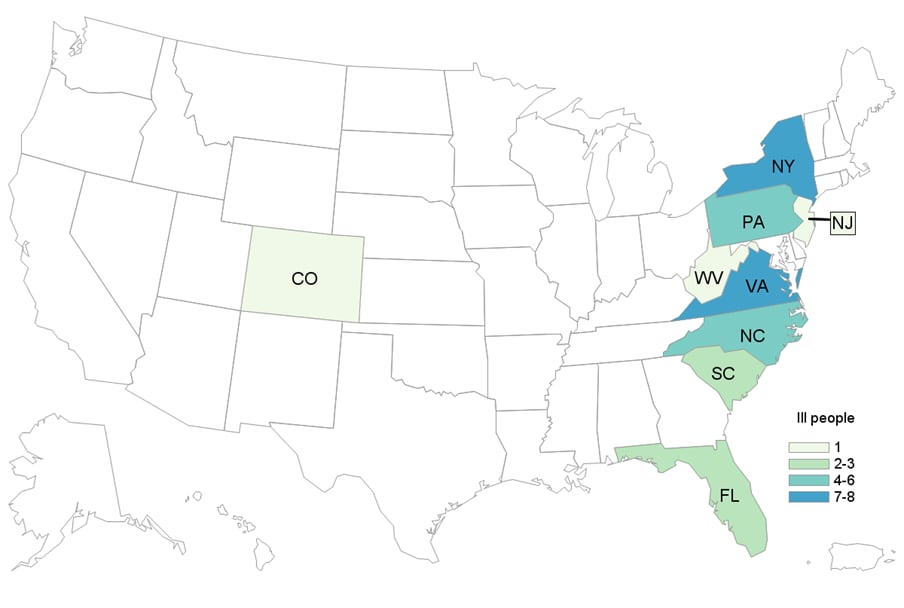Archive for the ‘Food-borne diseases’ Category
During 1998–2013, there were 972 raw produce outbreaks reported resulting in 34 674 outbreak-associated illnesses, 2315 hospitalisations, and 72 deaths.
Friday, June 29th, 2018Produce-associated foodborne disease outbreaks, USA, 1998–2013
-
- https://doi.org/10.1017/S0950268818001620
- Published online: 20 June 2018
“…..Raw produce outbreaks were most commonly attributed to vegetable row crops (38% of outbreaks), fruits (35%) and seeded vegetables (11%). The most common aetiologic agents identified were norovirus (54% of outbreaks), Salmonella enterica (21%) and Shiga toxin-producing Escherichia coli (10%). ….”
People who reportedly consumed Del Monte Fresh Produce pre-packaged vegetable trays containing broccoli, cauliflower, carrots, and dill dip from Kwik Trip/Kwik Star and were infected with Cyclospora as of June 21, 2018 (n=144)
Saturday, June 23rd, 2018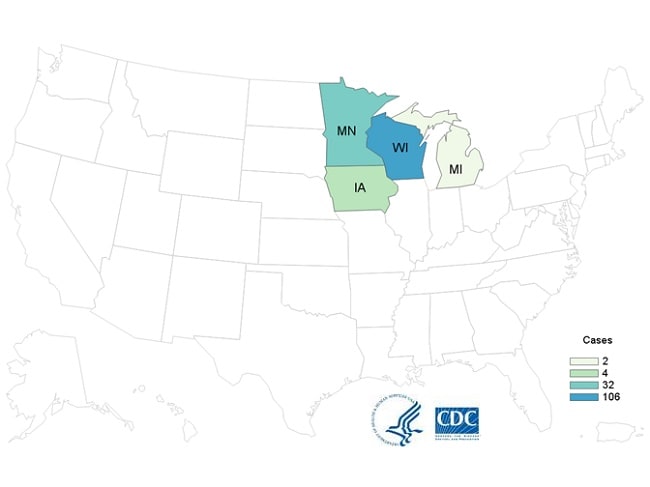
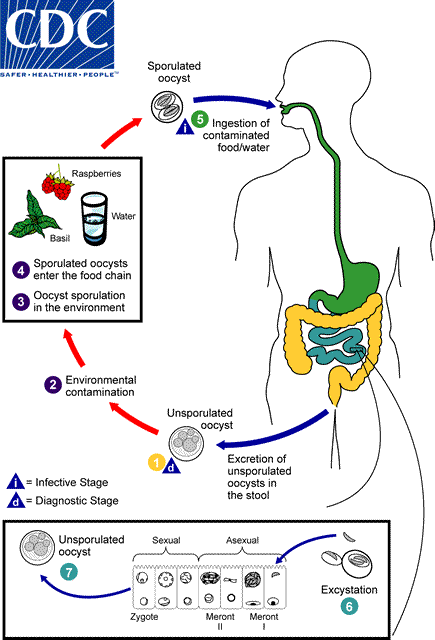
Some of the elements of this figure were created based on an illustration by Ortega et al. Cyclospora cayetanensis. In: Advances in Parasitology: opportunistic protozoa in humans. San Diego: Academic Press; 1998. p. 399–418.
When freshly passed in stools, the oocyst is not infective  (thus, direct fecal-oral transmission is unlikely; this differentiates Cyclospora from another important coccidian parasite, Cryptosporidium). In the environment
(thus, direct fecal-oral transmission is unlikely; this differentiates Cyclospora from another important coccidian parasite, Cryptosporidium). In the environment  , sporulation usually requires at least 1–2 weeks at temperatures from 22°C to 32°C, and results in division of the sporont into two sporocysts, each containing two elongated sporozoites
, sporulation usually requires at least 1–2 weeks at temperatures from 22°C to 32°C, and results in division of the sporont into two sporocysts, each containing two elongated sporozoites  . Fresh produce and water can serve as vehicles for transmission
. Fresh produce and water can serve as vehicles for transmission  , and the sporulated oocysts are ingested (in contaminated food or water)
, and the sporulated oocysts are ingested (in contaminated food or water)  . The oocysts excyst in the gastrointestinal tract, freeing the sporozoites, which invade the epithelial cells of the small intestine
. The oocysts excyst in the gastrointestinal tract, freeing the sporozoites, which invade the epithelial cells of the small intestine  . Inside the cells, they undergo asexual multiplication and sexual development to mature into oocysts, which will be shed in stools
. Inside the cells, they undergo asexual multiplication and sexual development to mature into oocysts, which will be shed in stools  .
.
Salmonella Adelaide Infections Linked to Pre-Cut Melon: Ten more ill people from five states were added to this investigation since the last update on June 8, 2018.
Wednesday, June 20th, 2018The number of people with jaundice symptoms in Thalakkulathur grama panchayat is up to 84 as the Health Department suspects that the “welcome drink” served at a private party had led to the outbreak
Tuesday, June 19th, 2018“……Sources in the department said adulterated ice blocks were reportedly used while mixing the drink. Many of the ice factories are unaware of the hygienic practices to be followed while making ice blocks….”
Kellogg’s Honey Smacks cereal linked to a multistate outbreak of Salmonella infections.
Saturday, June 16th, 2018CDC recommends people do not eat recalled Kellogg’s Honey Smacks cereal because it has been linked to a multistate outbreak of Salmonella infections.
Important advice for consumers and retailers:
- Do not eat recalled Kellogg’s Honey Smacks cereal. Check your home for it and throw it away, or return it to the place of purchase for a refund.
- Retailers should not sell or serve recalled Kellogg’s Honey Smacks cereal.
- On June 14, 2018, the Kellogg Company recalled 15.3 oz. and 23 oz. packages of Kellogg’s Honey Smacks cereal.
- Recalled Kellogg’s Honey Smacks cereal have a “best if used by” date from June 14, 2018 through June 14, 2019. The “best if used by” date is on the box top.
- The recalled 15.3 oz. Kellogg’s Honey Smacks cereal has a UPC code of 38000 39103. The recalled 23.0 oz. Kellogg’s Honey Smacks cereal has a UPC code of 38000 14810. The UPC code is on the bottom of the box.
- Even if some of the cereal was eaten and no one got sick, throw the rest of it away or return it for a refund.
- If you store cereal in a container without the packaging and don’t remember the brand or type, throw it away.
- Thoroughly wash the container with warm, soapy water before using it again to remove harmful germs that could contaminate other food.
Investigation details:
- CDC, public health and regulatory officials in several states, and the U.S. Food and Drug Administration are investigating a multistate outbreak of Salmonella Mbandaka infections.
- 73 people infected with the outbreak strain have been reported from 31 states.
- 24 people have been hospitalized. No deaths have been reported.
- Epidemiologic evidence indicates that Kellogg’s Honey Smacks cereal is a likely source of this multistate outbreak.
- This investigation is ongoing and CDC will provide updates when more information is available.
A multistate outbreak of Salmonella Mbandaka linked to Kellogg’s Honey Smacks cereal.
Saturday, June 16th, 2018June 14, 2018
The U.S. Food and Drug Administration, along with the Centers for Disease Control and Prevention (CDC) and state and local partners, are investigating a multistate outbreak of Salmonella Mbandaka illnesses that may be linked to Kellogg’s Honey Smacks cereal.
Fast Facts
- The FDA, CDC, along with state and local officials are investigating a multi-state outbreak of Salmonella Mbandaka infections. Kellogg’s Honey Smacks sweetened puffed wheat cereal are a likely source of this outbreak.
- The CDC reports that 73 people in 31 states have become ill. There have been 24 hospitalizations and no deaths.
- Following discussion with FDA, CDC, and state partners, the Kellogg Company voluntarily recalled Kellogg’s Honey Smacks cereal. The recalled products were distributed across the United States including Guam and Saipan and internationally in Costa Rica, Guatemala, Mexico, the Caribbean and Tahiti. Consumers should not eat any of the recalled Honey Smacks cereal.
- The FDA’s staff has initiated an inspection at the facility that manufactures Kellogg’s Honey Smacks and is working quickly with the company to collect additional information.
- As this is an ongoing investigation, the FDA will update this page as more information becomes available, such as product information, epidemiological results, and recalls.
- Consumers who have symptoms of Salmonella infection should contact their health care provider to report their symptoms and receive care. Most people infected with Salmonella develop diarrhea, fever, and abdominal cramps. Most infections usually lasts 4 to 7 days and most people recover without treatment, however some people develop diarrhea so severe that they need to be hospitalized.
What is the Problem and What is Being Done About It?
The FDA, CDC, along with state and local officials are investigating a multi-state outbreak of Salmonella Mbandaka infections. Epidemiologic and preliminary traceback evidence indicates that Kellogg’s Honey Smacks sweetened puffed wheat cereal is a likely source of this outbreak.
The FDA and CDC, along with our state partners contacted The Kellogg Company and as a result of discussions, the company has voluntarily recalled Kellogg’s Honey Smacks to prevent further distribution of potentially contaminated products. The recalled products were distributed across the United States including Guam and Saipan and internationally in Costa Rica, Guatemala, Mexico, the Caribbean, and Tahiti.
There are 73 people ill with this strain of Salmonella in 31 states: Alabama (2), Arizona (1), California (5), Connecticut (3), Georgia (2), Illinois (1), Indiana (3), Kentucky (1), Louisiana (2), Massachusetts (5), Maryland (1), Michigan (4), Mississippi (1), Montana (1), North Carolina (3), New Hampshire (1), New Jersey (3), New York (7), Ohio (1), Oklahoma (2), Oregon (1), Pennsylvania (5), Rhode Island (2), South Carolina (1), Tennessee (1), Texas (2), Utah (1), Virginia (4), Washington (3), Wisconsin (1), West Virginia (3).The ages of the ill people range from less than one year to 87 (median 58 years) and 65% of cases are female. Reported illness onset dates range from 3/3/18 – 5/28/18. Among 55 with available information, 24 (44%) have been hospitalized. No deaths have been reported.
Recalled Products
|
Description (Retail)
|
Size
|
BEST if Used By Date
|
|---|---|---|
| Honey Smacks (with limited distribution outside the U.S.) | 15.3 oz. | JUN 14, 2018 through JUN 14, 2019 |
| Honey Smacks | 23 oz. | JUN 14, 2018 through JUN 14, 2019 |

What are the Symptoms of Salmonella Infections?
Most people infected with Salmonella develop diarrhea, fever, and abdominal cramps. The illness usually lasts 4 to 7 days, and most people recover without treatment. Most people infected with Salmonella develop diarrhea, fever, and abdominal cramps 12 to 72 hours after infection.
In some people, the diarrhea may be so severe that they need to be hospitalized. In these patients, the Salmonella infection may spread from the intestines to the blood stream and then to other body sites and can cause death unless the person is treated promptly with antibiotics.
Who is at Risk?
Children are the most likely to get salmonellosis. The rate of diagnosed infections in children less than five years old is higher than the rate in all other people. Children younger than five, the elderly, and those people with weakened immune systems are more likely to have severe infections. It is estimated that approximately 400 persons in the United States die each year with acute salmonellosis.
What Do Restaurants and Retailers Need To Do?
Retailers should not sell and should discard all recalled products. The recalled products were distributed across the United States including Guam and Saipan and internationally in Costa Rica, Guatemala, Mexico, the Caribbean, and Tahiti.
Retailers, restaurants, and other food service operators should always practice safe food handling and preparation measures. It is recommended that they wash hands, utensils, and surfaces with hot, soapy water before and after handling food.
- Wash and sanitize display cases and refrigerators regularly.
- Wash and sanitize cutting boards, surfaces, and utensils used to prepare, serve, or store food.
- Wash hands with hot water and soap following the cleaning and sanitation process.
- Regular frequent cleaning and sanitizing of food contact surfaces and utensils used in food preparation may help to minimize the likelihood of cross-contamination.
What Do Consumers Need To Do?
Consumers should not eat any recalled Honey Smacks sweetened puffed wheat cereal. If already purchased, consumers should throw it away or return to the place of purchase for a refund. The FDA continues to collect information to determine any additional sources. The FDA will update this posting as soon as more information becomes available.
Consumers should always practice safe food handling and preparation measures. It is recommended that they wash hands, utensils, and surfaces with hot, soapy water before and after handling food.
Who Should be Contacted?
People who think they might have symptoms of a Salmonella infection should consult their health care provider. The FDA encourages consumers with questions about food safety to Submit An Inquiry, or to visit www.fda.gov/fcic for additional information.
Additional Information
E. coli O157:H7 Infections Linked to Romaine Lettuce
Saturday, June 2nd, 2018What’s New?
- Twenty-five more ill people from 13 states were added to this investigation since the last update on May 16, 2018.
- Three more states have reported ill people: Arkansas, North Carolina, and Oklahoma.
- Four more deaths were reported from Arkansas (1), Minnesota (2), and New York (1).
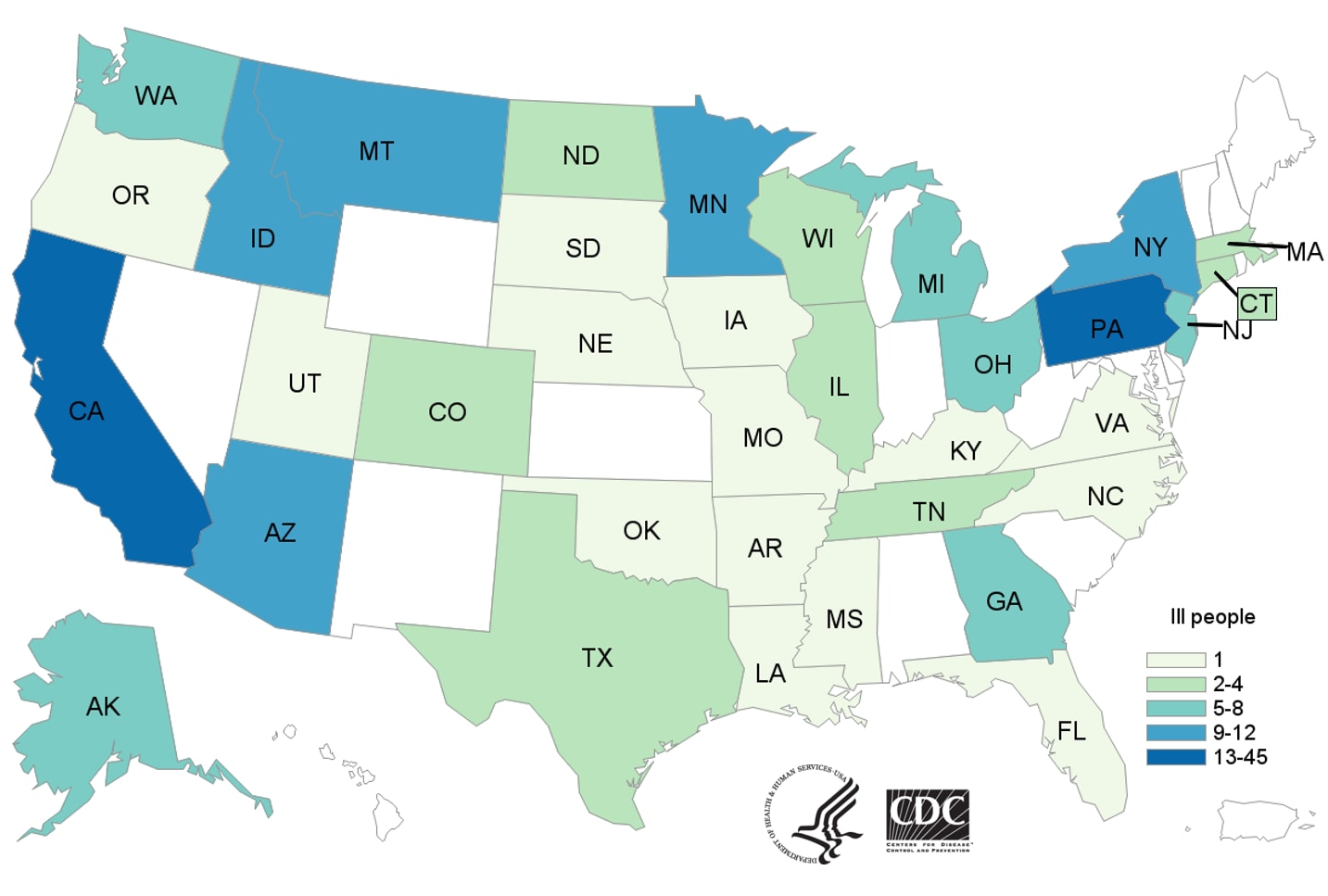
Salmonella Infections Linked to Dried Coconut
Tuesday, May 22nd, 2018As of April 16, 2018, 35 people infected with the outbreak strain of Salmonella Braenderup have been reported from 9 states.
Saturday, May 12th, 2018“….Consumers, restaurants, and retailers should not eat, serve, or sell recalled eggs produced by Rose Acre Farms’ Hyde County farm. Throw them away or return them to the place of purchase for a refund.
- These eggs were sold under multiple brand names, including Coburn Farms, Country Daybreak, Food Lion, Glenview, Great Value, Nelms, Publix, Sunshine Farms, and Sunups.
- Check egg cartons for the following numbers: P-1065 (the plant number) and another set of numbers between 011 and 102 (the Julian date), or, for Publix and Sunups egg cartons, plant number P-1359D and Julian date 048A or 049A with Best By dates of APR 02 and APR 03…..”
At A Glance
Cambodia: Rice wine tainted with alleged methanol may have killed at least 13 villagers and hospitalized another 200
Tuesday, May 8th, 2018“……The victims had the same symptoms such as stomach ache, vomit, sore throat, fatigue, dizziness, and breathing difficulty…..adding that all the victims aged between 24 and 73 years old…..”




